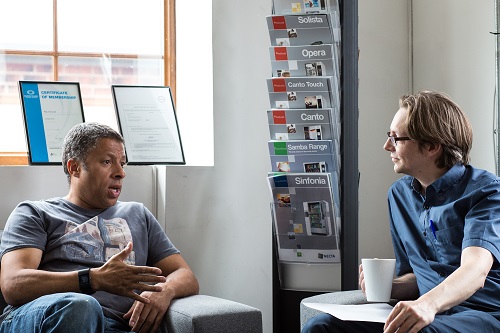One factor that puts human services among the easiest online master’s degrees is how broad this field is. Human services jobs encompass everything from community service worker at a nonprofit organization to administrator of a for-profit nursing home. Regardless of what job title you hold and where you work, you’re likely to fill certain roles in your work as a human services worker. These roles include being the one to identify a client’s needs, put together a treatment plan, implement that plan through direct or indirect actions and be a source of emotional support, according to the United States Bureau of Labor Statistics (BLS).
Identifying Needs
Identifying what needs there are to be filled is the first step toward making a difference in the lives of your clients or community. As a human services worker, you need to look at both the big picture and the smaller details to identify what your client needs. Needs can also be immediate or more long-term. If, for example, you’re working with a homeless individual, their most urgent needs may be a meal and a shelter where they can spend the night. However, they could also need job training and help starting an application for housing assistance.
The type of needs your clients have may be different depending on the population you work with or the type of service for which you work. If you work as a correctional treatment specialist, food and shelter may be a given, since the incarcerated individual lives in and is fed in the prison compound. However, you might identify deficits like a lack of education and job skills that will make transitioning back into society after completing their sentence more challenging. If you provide services for individuals with disabilities, you might identify unique needs like assistive devices and personal care services.
How do you identify a client’s problems? Interviewing them not only about the problem that brought them to you but about their support system, home and work environment and other factors during an intake can help you begin to understand the situation.
Developing a Treatment Plan
Once you’ve developed a clear picture of the challenges your client is facing, you can begin to work on a plan to address those needs. Graduates of a master’s degree program in human services often draw from what they’ve learned in classes like Human Services Helping Skills and Case Management Interventions and Strategies. A resourceful human services worker sometimes has to think outside the box to identify possible programs, services and other solutions. However, you must also be able to understand the details of these options, including eligibility requirements and whether there are spots or resources available.
Human services workers must prioritize needs and arrange the order of the interventions and services they’re seeking for their clients. or a person who has a substance abuse problem, getting that person into rehab may be more urgent than training for a new job.
Making That Intervention Plan a Reality
IMAGE SOURCE: Pixabay, public domain
Just having a treatment or intervention plan won’t help your client. You’re going to need to put in the work to make it happen. Depending on your job and your qualifications, how you go about implementing a treatment plan may mean giving direct assistance, such as a licensed professional counselor beginning counseling services, or connecting the client with other services and setting up that assistance. Human services workers may coordinate intervention services by making phone calls and helping their clients fill out forms and paperwork to enroll in programs.
The work of a human services professional doesn’t end once the plan is underway. Often, human service workers continue to check in with their clients on a regular basis, according to the BLS. If a program or service isn’t meeting the needs as planned or if a new need becomes apparent, the human services worker can adjust the treatment plan as needed and look for new methods of intervention.
Another role of a human services worker is to provide emotional support for clients, the BLS reported. You’re the one they count on to help get things back on track. That means you need to be a good listener and have compassion for the population you’re serving.
Additional Resources
What Real-World Problems Will a Degree in Human Services Prepare Me to Help Fight Against?
What Kind of Job Can You Get With a Degree in Human Services?

